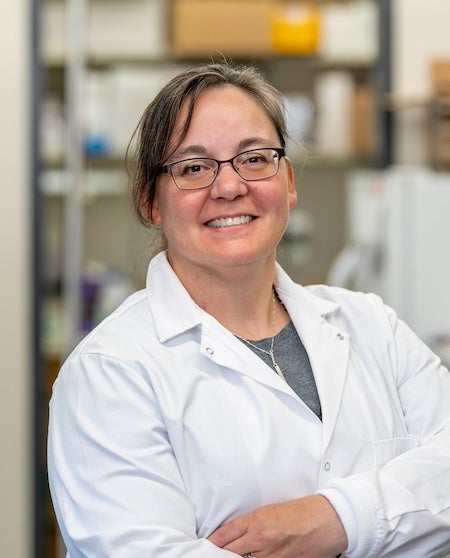
Dr. Juliette Tinker, professor in the Department of Biological Sciences at Boise State, is working to develop a vaccine to prevent udder infections in dairy cows. The bacterial pathogen, Staphylococcus aureus, is a leading worldwide cause of these infections, called mastitis. Mastitis is a common and costly disease for the dairy industry. Economic analysis estimates that mastitis costs the U.S. industry $1.8 -2 billion/year in reduced milk production and quality. Mastitis is also a main cause of animal mortality, and, despite low efficacy of treatment, a main reason for the use of antibiotics in dairy cows.
An effective vaccine to prevent mastitis will not only reduce the burden of disease and reduce antibiotic use, it will also have positive local economic effects. Idaho is ranked third in the nation for milk and cheese production, with 16.4 billion pounds of milk produced in 2021 at an estimated value of over $3 billion. The dairy industry supports a growing food industry in Idaho and, directly or indirectly, employs an estimated 47,000 workers. Boise is also one of the fastest growing cities in the U.S. and is located at the center of the most productive agricultural region in the state. Dr. Tinker research is supporting a local biotechnology start-up with the focus of bovine vaccine development. This technology transfer would support regional priorities and stimulate academic-industry collaboration. Research capacity at BSU is rapidly expanding and includes emerging doctoral programs in Biomolecular Sciences, Biomedical Engineering and Ecology, Evolution and Behavior. Collaborations with industry provide an opportunity to build on this local expertise, expand job opportunities and the pool of talented employees, and create solutions to local problems.
The long-term goal of the NSF TRANSFORM Seed grant is to support the technology transfer of this vaccine so that it can benefit the dairy farmer and the cow. Currently, a USDA STTR Phase I grant is funding a small-scale clinical trial, but to advance to Phase II and beyond, vaccine production must be optimized and scaled up. Dr. Tinker’s seed grant has three primary aims: 1. sustainable improvements in vaccine production through vector and host optimization; 2. establishment of protocols for increasing scale of vaccine production; and 3. workforce training in vaccine manufacturing and licensure. These goals will strongly support the transfer of knowledge and talent to industry to enable the use of this technology.